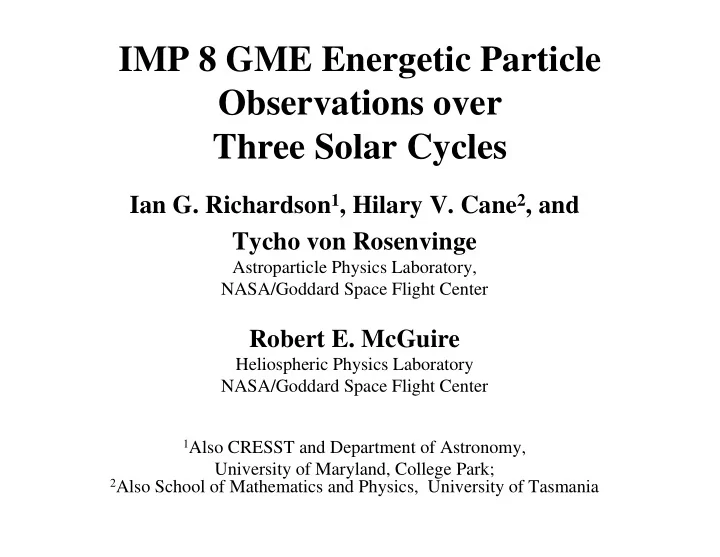

IMP 8 GME Energetic Particle Observations over Three Solar Cycles Ian G. Richardson 1 , Hilary V. Cane 2 , and Tycho von Rosenvinge Astroparticle Physics Laboratory, NASA/Goddard Space Flight Center Robert E. McGuire Heliospheric Physics Laboratory NASA/Goddard Space Flight Center 1 Also CRESST and Department of Astronomy, University of Maryland, College Park; 2 Also School of Mathematics and Physics, University of Tasmania
IMP 8 • Launched October 26, 1973; • ~35 R e orbit, ~12 day period (~7 days in solar wind); • Mission officially terminated in October, 2001; tracking continued until contact with the spacecraft was lost in late 2006; • GME (Goddard Medium Energy) Experiment; • Measurements of ~1 – 400 MeV/n protons and heavy ions ; 3 - 18 MeV electrons; Intensities and anisotropies; • 3 separate instruments (VLET, LED, MED); • http://spdf.gsfc.nasa.gov/imp8_GME/GME_home.html.
Overview of Sunspot Number and IMP 8 GME 0.88 – 230 MeV Proton Observations, 1973 - 2005 Cycle 21 Cycle 22 Cycle 23 CIR- Accelerated (Bad Data Points) LED Detector Failure Solar Energetic Particles Cosmic Rays A>0 A<0 A>0 A<0
Shock of September 24, 1998 Broad particle peak around shock + clean flow reversal (E09º; θ Bn =78º)
Example of Shock Spike Pancake Distribution => Shock Drift Acceleration; θ Bn =80º
0.88-1.15 MeV Proton Intensity vs Local Shock Speed
0.88-1.15 MeV Proton Intensity vs Shock Compression
Examples of CIR-Associated 0.88 – 1.15 MeV Proton Enhancements and Cosmic Ray Modulations, January – April, 2005 V sw
Sunward proton 4 - 22 MeV Proton Flow flow from CIR Azimuth Distribution, reverse shocks February 5 – April 30, 2005 Sunward Flow 0° 180° 360°
Anti-Coincidence Counting Rates (3-year intervals around 4 solar minima) Richardson, Cane and Wibberenz (1999) noted that recurrent (~27 day) galactic cosmic ray modulations are larger in A>0 epochs. The pattern continues in the current epoch (A<0). (Bad data points also present in 2005-2006.)
Summary • The IMP 8 GME has provided a wealth of observations of energetic particles, including SEP, CIR events, and galactic cosmic rays, extending over three solar cycles (October, 1973 - late 2006).
Recommend
More recommend